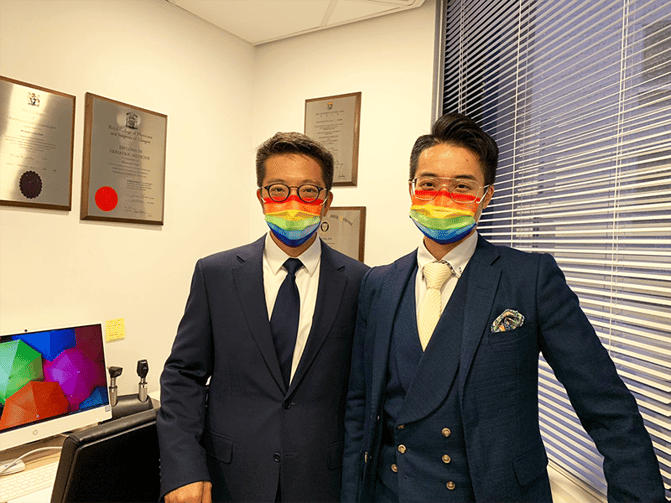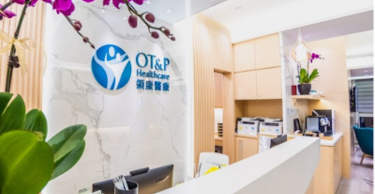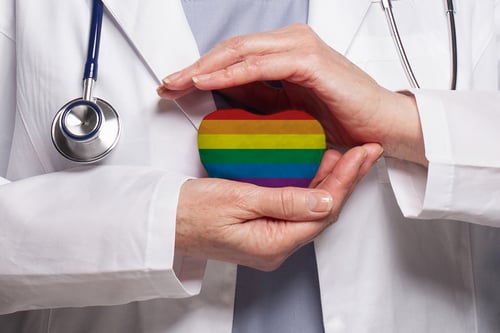Written by Dr Winston Goh & Dr Zephyrus Tsang
June is International Pride Month. In order to highlight our support to the LGBT+ community, we are happy to feature a personal perspective by Dr Zephyrus Tsang who describes growing up as a transgender individual.
Dr Zephyrus Tsang (he/him) is a transgender man based in Hong Kong. He is the vice-chairperson of a local transgender youth organization - Quarks. Quarks provides peer support for the younger generation of the Hong Kong transgender community and promotes transgender issues to the general public.
Dr Tsang is also a doctor, currently working in local public hospitals. He is a steering committee member of Hong Kong LGBT Medical Society, which encourages LGBT+ diversity and inclusion among healthcare professionals, and promotes LGBT+ related healthcare and education in Hong Kong. He is also an amateur penman, an avid lover of fountain pens and ink.

OT&P: What drove you to pursue a career in medicine?
Dr Tsang: I was always interested in the Sciences in school, but I would not consider myself the "typical" student who always dreamed of becoming a doctor from a very young age.
When did you realize you are a male?
When I entered puberty, I experienced a lot of distress surrounding the way my body developed and how I had to dress. I also had an occasion where I had a taste of being boyish. One of these occasions was playing a male character in a play of Romeo and Juliet. This gave me a profound realization that I am much more than my boyish appearance. I am a male and being a male is appropriate and joyful for me. It was not until I was 18 years old, when I watched a television show introducing a local trans organization called Gender Empowerment and listened to a transgender man sharing about his experience, did I realize that what I was feeling was called transgender.
When did you decide to start transitioning and living as a man?
When I was in my 4th year of medical school, I spoke for the first time with a counsellor about how I was feeling. I harboured many negative feelings and even thoughts of suicide. Transitioning seemed impossible at that time. Seeing her helped me verbalize my identity and experience and this encouraged me to seek medical advice on gender transition. Subsequently, I came out to my closest friends and ultimately, my parents. I told them I was a man, a transgender man, and I had been experiencing a great amount of gender dysphoria over the years. At first, my parents were confused about the topic of sex and gender and did not know how to react to my feelings. The more I opened up about my true feelings, the more my relationship with my parents changed for the better. They became more open and accepting and did their own research on the topic. It was not until my Final Year in Medical School that I received my appointment to start male hormone injections supervised by endocrinologists.
What were some of the challenges you faced as a trans man (in your personal and professional life?)
The most challenging but intriguing aspect was the metamorphosis. It required breaking free from previous rules and frameworks, including others' expectations. It was at times disorientating but eventually rewarding, in the exploration of who I really was. After some early struggles and frustrations, I have found that different aspects of my life are finally moving in the right direction.
How did you come to a place of being content with who you are?
I came to realize that I was born with a male identity. I just needed a leap of faith and to make some small changes in my life. For example, cutting my hair short and hearing my voice deepening, were concrete gender-affirming changes. Having the support and recognition from my family and friends were significant as well. I have also changed my legal name, albeit the gender marker on my Hong Kong Identity Card cannot be changed without undergoing all components of gender reassignment surgery. But this would not affect who I am and how I live.
What do you think doctors and other health professionals can do to make the consultation or doctor-patient relationship more welcoming for transgender people?
To begin with, of course, we need to have basic knowledge about sex and gender.
Make no assumptions. Always ask about what a person’s gender is if you are unsure. For example, their chosen name and pronouns and how they would like to be treated. The overarching principle is being professional and treating everyone with kindness and respect.
What is one thing you would like people to know about who you are?
I am just one of the guys in your neighbourhood. And like everyone else, we share many similarities, but of course, all of us are different in our own way. We all have an intersection of identities and aspects of life apart from our sex and gender.
 Central General Practice
Central General Practice
 Repulse Bay
Repulse Bay
 Clearwater Bay
Clearwater Bay
 BodyWorX Clinic
BodyWorX Clinic
 Central Specialist Clinic
Central Specialist Clinic
 MindWorX Clinic
MindWorX Clinic
 Partner Clinics
Partner Clinics
 Family Clinic
Family Clinic
 OT&P Annerley Midwives Clinic
OT&P Annerley Midwives Clinic
 WellWorX Clinic
WellWorX Clinic





